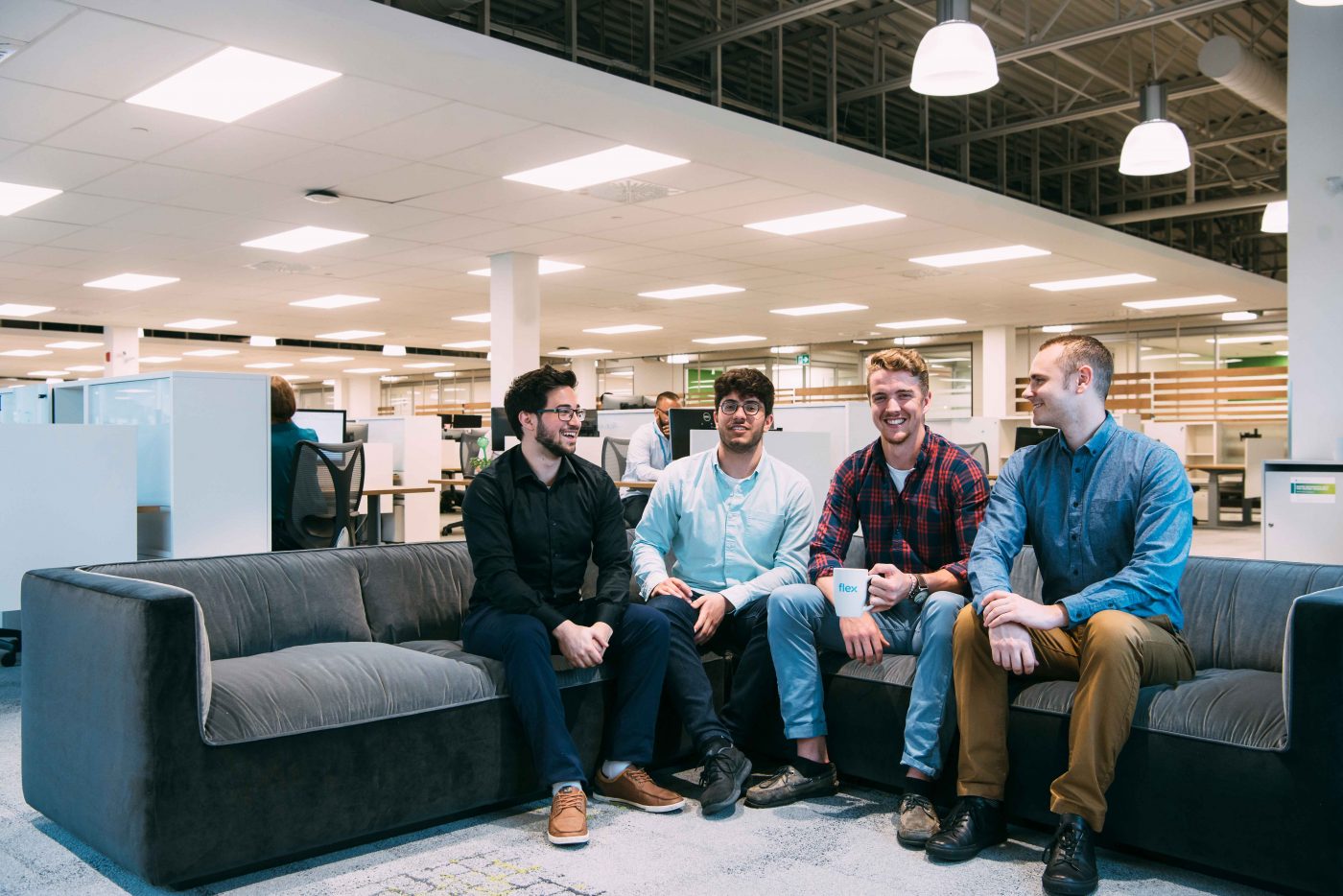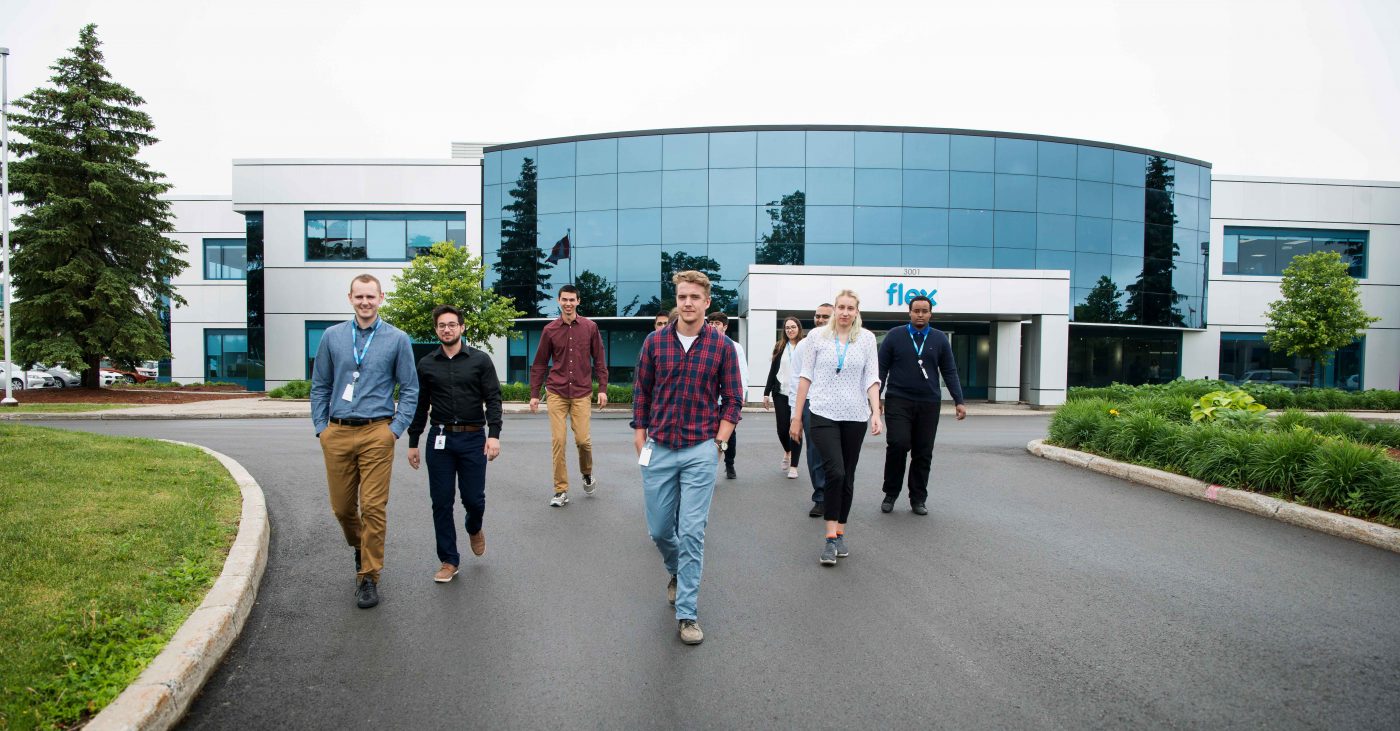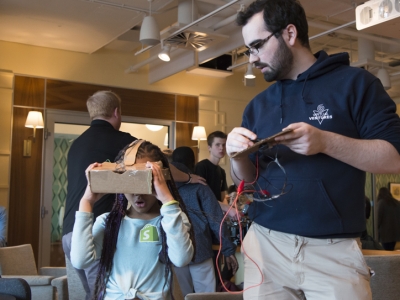By Ainslie Coghill
Carleton students from electrical and mechanical engineering, along with students from the Sprott School of Business have been granted exclusive access inside multinational technological manufacturer Flex, thanks to the Carleton co-op program’s partnership with the company’s Ottawa location. We last checked in with Flex – known then as Flextronics – back in 2015.
Under a new name, and a new roof, the company’s latest facility opened this year in the heart of the Kanata North Business Park. The state-of-the-art space has been custom designed to allow the company to co-innovate with multiple customers while protecting everyone’s intellectual property, says Jeff Tilton, Site Leader and General Manager of the new location.
With approximately 200,000 employees in over 30 countries, Flex has worked with high-profile clients like Google, Nike, and NASA, and has a remarkable depth of industry expertise. The company’s trademarked “Sketch to Scale” business model dictates that from conception and prototyping to engineering and advanced manufacturing to reverse logistics, Flex helps customers build and scale products for the global marketplace.
According to Tilton, who was originally an electrical engineer with the company, Flex is a great fit for co-op students.
“We think Flex is an ideal company for students to gain experience because of the very broad exposure to multiple products and markets that our students participate in over the course of their co-op term,” says Tilton.

Students in Carleton’s co-op program are granted exclusive access to Flex’s Kanata-based location.
“One of the things that attracted me to Flex was their global scale and the opportunity to get involved with such a wide breadth of projects,” says Michael Heffer, an electrical engineering student nearing the end of his coop term with the company.
“Even as a student, I’ve been exposed to a number of different industries including telecommunications, automotive, and health. This kind of versatility allows me to gain experience in several areas of electrical engineering.”
Whether it be debugging circuits or getting a chunk of code to simulate, Heffer says the ability to work on projects from conception to end result has given him a better understanding of the “big picture” while expanding his problem solving skills and creativity.
“Students are embedded into the design team and receive a realistic view of how projects are executed,” says Orlando Arnone, Director of Engineering and Operations at Flex. Formerly employed with Nortel Networks, Arnone began working with Flex in 2004.
Arnone’s role with the company includes grooming the local team in hopes of developing “the next set of technical and people leaders” for the Kanata site. He also recognizes there is a great amount of talent coming from Carleton co-op students, and personally oversees the group of engineering students.
“They bring a spark of curiosity and excitement, and their eagerness shows from the day they arrive. These students demonstrate a solid technical foundation, ask lots of questions and also learn from each other,” says Arnone.
Flex has hired four past co-op students at the Kanata location, and Arnone says they’ve been excellent additions to the team. He also has glowing reviews for the on-going assistance behind the scenes from Carleton’s co-op program team.
“The Flex-Carleton co-op program has been an excellent partnership. Resumés received are bundled by discipline to make for easy vetting of candidates,” he says.
“The interview process is simple and effective with Carleton providing the option of holding interviews on campus or at the Flex site. Once offers are made, the co-op office issues the offers in a timely manner. Working with Carleton couldn’t be easier.”
Electrical engineering student Nicholas DiPaolo’s co-op work term with Flex is off to a great start.
“At Carleton, I learned many technical aspects of electrical engineering including analog, digital, and power electronics. Flex is now giving me the opportunity to apply these skills to real world applications,” says DiPaolo, adding that he now has experience with soldering and building prototypes and test fixtures, and has been exposed to all stages of a product’s life cycle.

Heffer, with almost 16 months at Flex under his belt, agrees that the industry experience has been indispensable, and that seeing the practical application of class material in the workplace has helped solidify the theory he’s learned at Carleton.
“My circuit analysis courses have proven to be very useful with many PCB (Printed Circuit Board) modifications, and I’ve now had the opportunity to employ my analytical skills to debug real circuit issues,” says Heffer. “I have also implemented my knowledge of digital circuit design by coding FPGAs (Field Programmable Gate Arrays) in Verilog.”
From its beginnings in 2010, the partnership between Flex and Carleton’s co-op program shows no signs of slowing down.
“Each year, over the 16 months that our students are with us, we see a progression from young academics to competent, contributing and innovative professionals that are ready to enter the workforce,” says Tilton.
Are you an employer looking to find out about Carleton’s co-op program? Feel free to contact Robin McLaughlin at robin.mclaughlin@carleton.ca for more details.
Friday, September 7, 2018 in Co-op, Communications, Electrical, Experiential Learning, Feature Stories, Industry Collaboration, Undergraduate
Share: Twitter, Facebook



